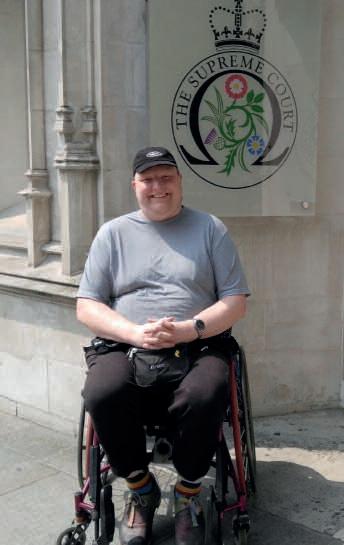
2 minute read
The Fight for Equality
By Doug Paulley
I am a wheelchair user through autonomic function rather than through spinal injury, but my experiences with acquired impairment will be familiar to many, I should think. There is a unique stress of being articulate and empowered, and yet in the vulnerable position of being reliant on others for everyday life.
Advertisement

Many disabled people with life-long impairments have sadly been let down by systems designed to empower them, and have to some extent (and through no fault of their own) become used to such treatment. In the care home in which I live, a workshop facilitator once asked residents what they would like to do or achieve if they had all the support and resources they needed, but the idea was so alien to people who don’t get the assistance to leave the building for weeks at a time, that they were stunned into silence. This is shocking and utterly unacceptable. Suddenly arriving into this dynamic, from a background of being a bright and independent nondisabled person, came as a huge shock to the home, Social Services and to me.
Many of the services we receive aren't geared up for disability equality. This includes both services for the general public, and services specifically for disabled people. We live in a world in which the Disability Discrimination Act and its successor the Equality Act have been around for 20 years. All service providers have a duty to make reasonable adjustments to ensure access for disabled people. Yet a walk down the high street reveals shops don’t have wheelchair access; Sky TV don’t have subtitles on their On Demand programming; Government information is not provided in Easyread; and town planners are building shared spaces in the full knowledge that they are difficult and dangerous for blind people to navigate. These are obvious barriers; there are major attitudinal barriers, including the portrayal of disabled people as malingering scroungers (‘life unworthy of life’...), assumptions about people with invisible impairments, and people refusing to give up the wheelchair spaces on buses without good reason. It is these things that disable us, that prevent us from taking as active a part in society as we would like and as we deserve.
If discrimination is illegal and providers must make reasonable adjustments for disabled people, why is this so widespread? The answer: enforcement. The Equality Act 2010 makes it illegal for service providers to fail to make reasonable adjustments, however only individual disabled people can enforce the Act. They have to do so through the Courts (which have their own access problems) and usually have to do so without a solicitor. This model is fundamentally flawed.
If somebody was to get food poisoning from a dodgy kebab, they could complain to the Council that they hadn’t inspected the kebab shop properly and ask them to take action. If one is prevented from accessing the kebab shop and thus denied the opportunity of acquiring salmonella in the first place, one can’t just call Environmental Health or the Police, one has to make a complaint to the shop and if necessary prosecute the owner oneself. Why aren’t service providers inspected for access, just like food safety or health and social care inspections? Why has this been set up differently?
I think those who can take legal action on discrimination should do so for their benefit, and that of other disabled people. There is a cost in time, risk, finance and headspace in doing so - on top of the extra hassle and stress we all experience daily due to our impairments. I am currently awaiting the judgment in Paulley vs Firstbus, after a driver refused to insist a mother removed her pushchair from a bus’s wheelchair space so I could travel. That case has been in the courts for 5 years now; the Supreme Court judgment should be out this side of Christmas. But despite these difficulties, I think more disabled people should fight because without us, nothing will change.
By Lee Fawcett








